
Evidence for the ancient, 1.2 billion years old, meteorite strike, was first discovered in 2008 near Ullapool, NW Scotland by scientists from Oxford and Aberdeen Universities. The thickness and extent of the debris deposit they found suggested the impact crater—made by a meteorite estimated at 1km wide—was close to the coast, but its precise location remained a mystery.
In a paper published today in Journal of the Geological Society, a team led by Dr. Ken Amor from the Department of Earth Sciences at Oxford University, show how they have identified the crater location 15-20km west of a remote part of the Scottish coastline. It is buried beneath both water and younger rocks in the Minch Basin.
Dr. Ken Amor said: 'The material excavated during a giant meteorite impact is rarely preserved on Earth, because it is rapidly eroded, so this is a really exciting discovery. It was purely by chance this one landed in an ancient rift valley where fresh sediment quickly covered the debris to preserve it.
'The next step will be a detailed geophysical survey in our target area of the Minch Basin.'
Using a combination of field observations, the distribution of broken rock fragments known as basement clasts and the alignment of magnetic particles, the team was able to gauge the direction the meteorite material took at several locations, and plotted the likely source of the crater.
Dr. Ken Amor said: 'It would have been quite a spectacle when this large meteorite struck a barren landscape, spreading dust and rock debris over a wide area.'
1.2 billion years ago most of life on Earth was still in the oceans and there were no plants on the land. At that time Scotland would have been quite close to the equator and in a semi-arid environment. The landscape would have looked a bit like Mars when it had water at the surface.
Earth and other planets may have suffered a higher rate of meteorite impacts in the distant past, as they collided with debris left over from the formation of the early solar system.
However, there is a possibility that a similar event will happen in the future given the number of asteroid and comet fragments floating around in the solar system. Much smaller impacts, where the meteorite is only a few meters across are thought to be relatively common perhaps occurring about once every 25 years on average.
It is thought that collisions with an object about 1 km (as in this instance) across occur between once every 100,000 years to once every one million years—but estimates vary.
One of the reasons for this is that our terrestrial record of large impacts is poorly known because craters are obliterated by erosion, burial and plate tectonics.
Explore further
Michael J. Simms et al. A reassessment of the proposed 'Lairg Impact Structure' and its potential implications for the deep structure of northern Scotland, Journal of the Geological Society (2019). DOI: 10.1144/jgs2017-161
Citation: Site of biggest ever meteorite collision in the UK discovered (2019, June 10) retrieved 10 June 2019 from https://phys.org/news/2019-06-site-biggest-meteorite-collision-uk.html
This document is subject to copyright. Apart from any fair dealing for the purpose of private study or research, no part may be reproduced without the written permission. The content is provided for information purposes only.
https://phys.org/news/2019-06-site-biggest-meteorite-collision-uk.html
2019-06-10 07:29:57Z
CAIiEA55J5y9fTf2qtql7piYBqwqFwgEKg8IACoHCAowpbDpAzCm_hwwj9kp




